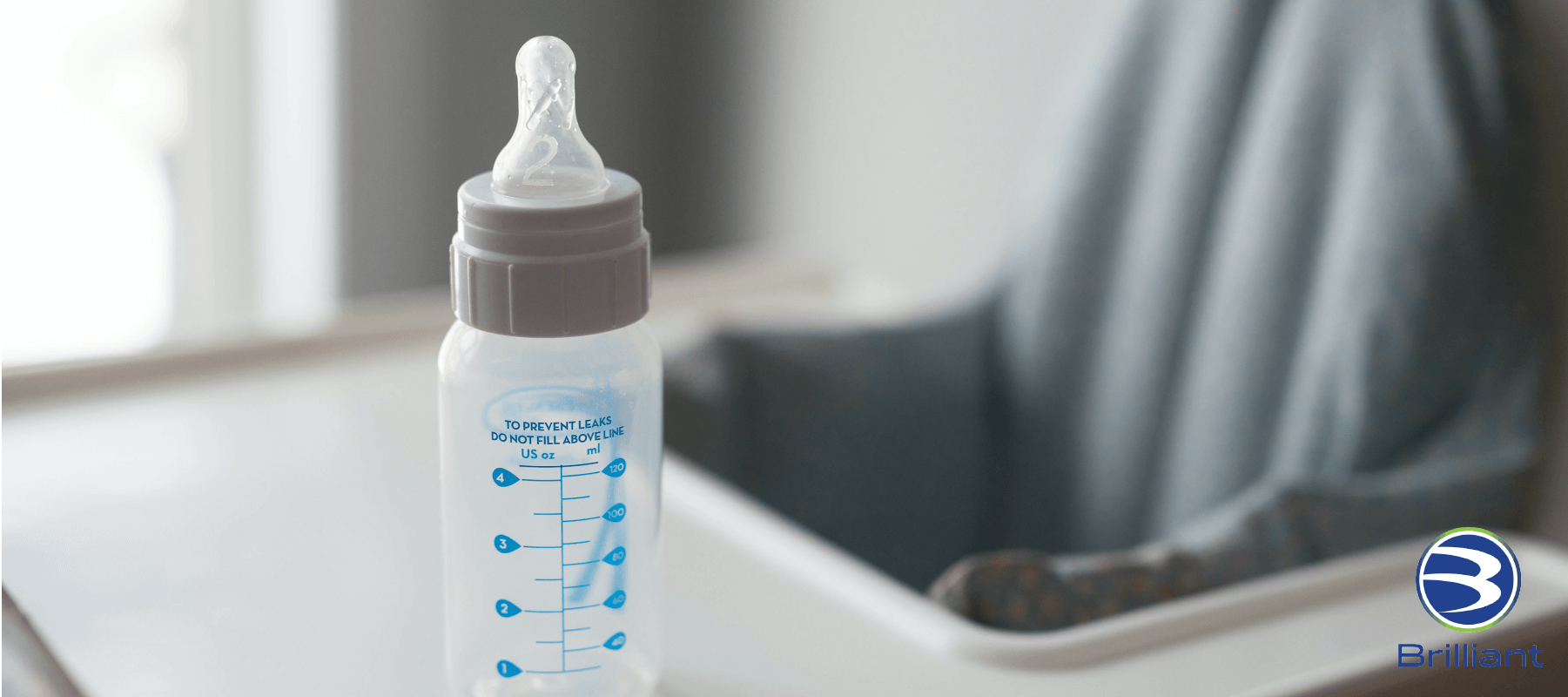- Phone: 1.404.373.4030
- Opening Hours: Mon-Fri 9AM-5PM Eastern

DISCLOSURE: Noelle Copeland RDH is the oral care specialist and dental consultant to the Brilliant and Baby Buddy oral care lines through Compac Industries. See terms below.
Simply put, it is when a tooth becomes decayed due to frequent and long term exposure to liquids that contain sugars. It doesn’t happen overnight, however when a routine has been adopted, typically in the evenings at bedtime, where a child is put to sleep for the night with a bottle in their mouth, this is when rapid decay can happen. The reason this situation can cause tooth decay is because the liquid sugars that get left in the child’s mouth, undisturbed while they sleep, pool around the gumline and in between teeth, feeding the oral bacteria, causing harmful acids that slowly break down the tooth’s enamel, in turn, causing decay.
Most babies get their first tooth between 6 months of age to 12 months of age. Once the first tooth has erupted into the mouth it is susceptible to the environment of the mouth, and if that environment is regularly exposed to liquid sugars from milk, juice, sodas or teas, then this can become a high risk situation for bottle decay.
Start good habits early. This includes an early oral care routine that can start very early, with a newborn! Get in the habit of regularly performing oral care for your baby and continue this habit in addition to some other guidelines for oral health.
The first thing to do is get the decay removed and treated by a dental professional. Just because baby teeth eventually fall out, it does not mean they are any less important than the adult teeth. Remember that the last baby tooth doesn’t fall out until the ages of 12-13 years, so that’s a long time that those baby teeth need to be healthy and functioning correctly. In fact, if baby teeth are pre maturely lost, due to decay or trauma, it can affect speaking and eating, cause crowding or spacing and overall, has a negative effect on oral health development.
After the decay has been removed and treated, re-evaluate and change the routines that led to it.
I understand this can be a daunting task to overhaul if you have utilized an evening bottle to fill the tummy of an unsettled baby to get them to sleep through the night or if your child has been over using a pacifier for soothing and sleeping. I completely get that. However, The American Academy of Pediatrics recommends being completely free of bottles by the age of 18 months and sooner than that, is even better. Additionally, The American Dental Association recognizes that the overuse of pacifiers can lead to tooth decay and negatively impact the proper eruption patterns of baby teeth.
Once you have a new routine established and have a good understanding of what not to do to encourage baby bottle decay, you will still need to bend and flex as your child grows. Good oral health habits will grow and change as your child does. Here are some things to consider.
Snacks, snacking, mindless munching! Especially for kids, can lead to negative oral health implications, especially cavities and decay. Not to mention that most of the “snacks” kids are given are typically sticky, gummy, and chewy foods that get trapped in the pits and grooves of teeth.
When it comes to oral health, sitting down to have a meal three times a day is better than endless snacking and multiple small meals! I understand this is contrary to what some other professionals may recommend for weight control or other medical conditions. However, when it comes to your oral health, frequent eating can contribute to pathogenic oral bacteria being fed all day long, those bacteria in turn produce acids that break down tooth enamel more rapidly when stimulated excessively. As with any diet and nutrition plan, always consult with your medical doctor about your questions, concerns and for guidance.
For children, snacking becomes an even more slippery slope that can lead to decay when left unchecked. A lot of the snacks that are given to children are not healthy for the body or the teeth. Added sugars plague the grocery store snack aisles that are filled with crackers, cereals, dried fruits, granola bars, candy, and treats. When kids eat unhealthy snacks, they don’t want to eat healthy meals. When kids come to the table a little bit hungry they are more likely to eat healthier options when having a meal and are even more willing to try NEW foods.
So how does all of this help prevent bottle decay. Well, knowledge is only good if you understand it and know what to do with it. I was always taught that knowledge is only the imprint of knowing something, however, “wisdom” is knowing what to do with it! When habits are established early whether they be good habits or potentially bad habits, the effects can be long standing. So now you have knowledge about what bottle decay is and how it can start, in addition, you have some nuggets of wisdom, to help you navigate through what you can do to prevent it and to address it if needed. Once teeth start erupting, they need oral care indefinitely, if oral care has been absent before then, it absolutely needs to be started once teeth start popping up. Starting oral care early, “New Baby” early is best for prevention and habit forming acceptance. So start early, train regularly, and adjust as needed.
© 2020 Compac Industries. All rights reserved.
8/06/2020..This article is intended to provide an understanding of and knowledge about “oral health topics” as expressed through the perspective and experience of the author. It is not intended to be a substitute for professional advice or counsel, including the diagnosis or treatment of any condition. Always seek the advice of your dentist or other qualified healthcare provider with any questions you may have regarding a medical condition, an oral condition, illness or treatment of any listed or non listed situation above. By using this site, you signify your assent to our Terms and Conditions. If you do not agree to all of these Terms and Conditions, do not use this site.
Noelle Copeland RDH is an Oral Care Specialist and Dental Consultant who provides content for Brilliant Oral Care and Baby Buddy.


DISCLOSURE: Noelle Copeland RDH is an Oral Care Specialist and Dental Consultant who provides content

DISCLOSURE: Noelle Copeland RDH is an Oral Care Specialist and Dental Consultant who provides content

We believe that all people are fearfully and wonderfully made and designed in the womb for a grand purpose.
Useful Links
Copyright © 2023 Compac Industries | All Rights Reserved.